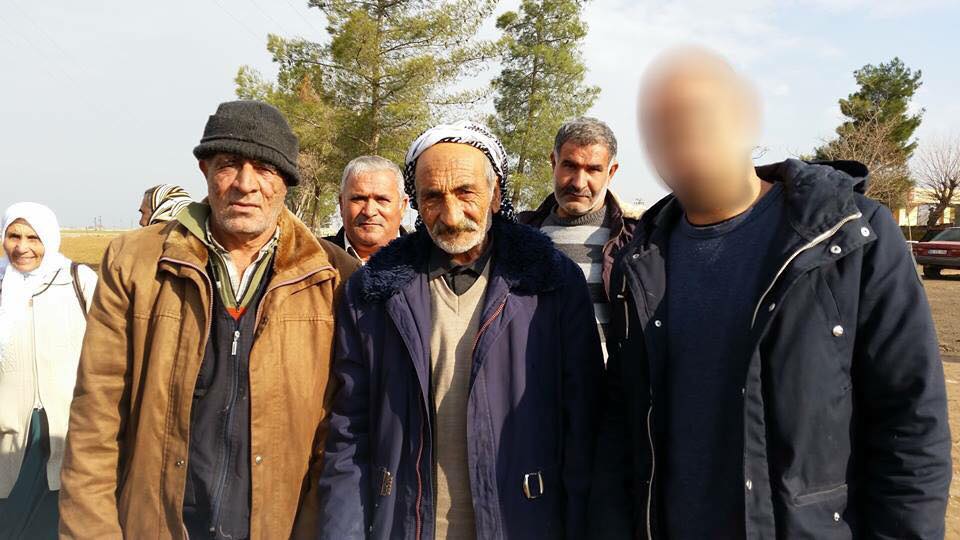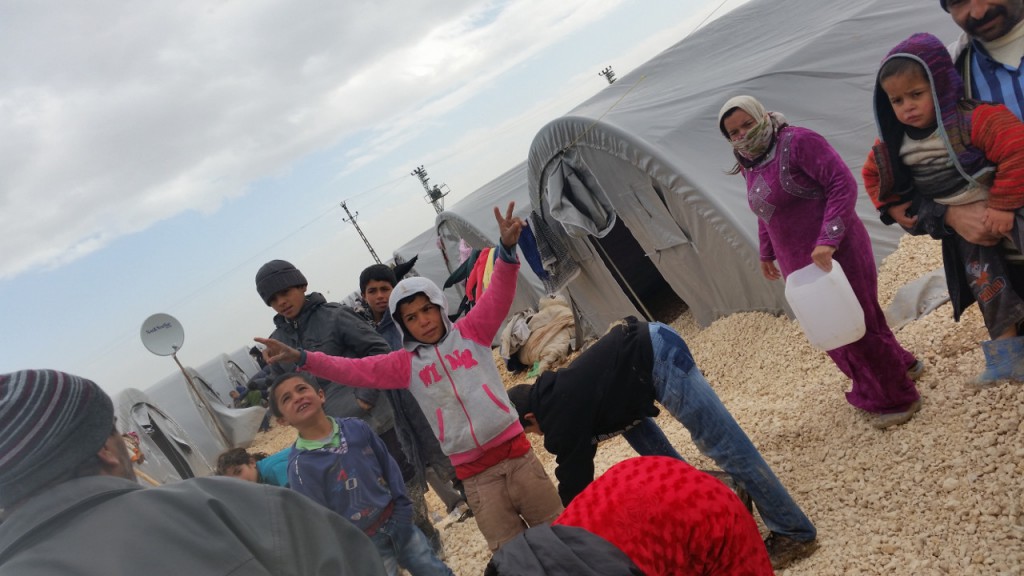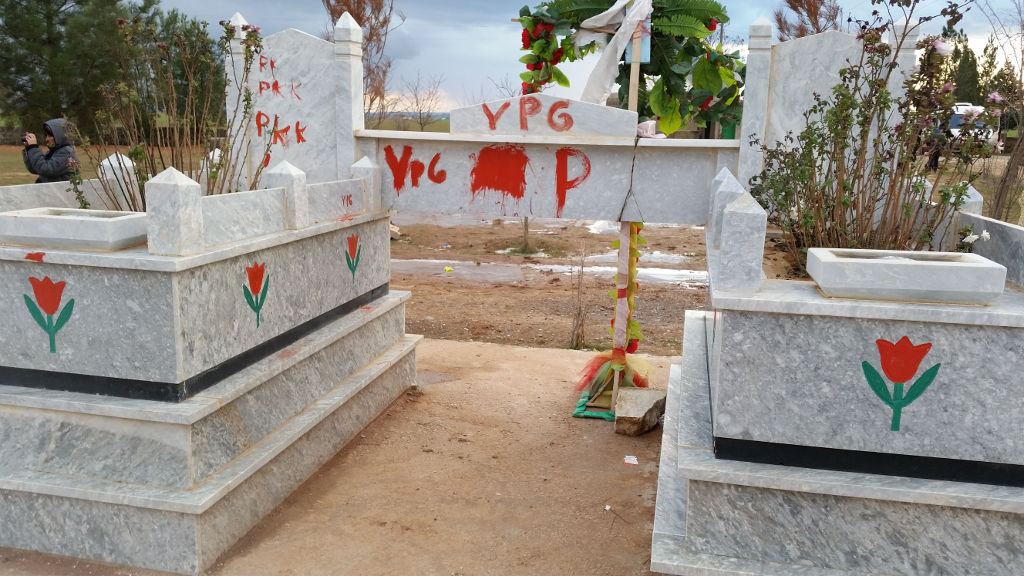Anti Fascist Action Stockholm [translation: b9AcE] | 2015-02-10
When we write this it is a little over a week since the Kobanê Canton’s defense forces, YPG and YPJ, declared victory in Kobanê.
The victory means a lot for the Kurds. The city’s resistance has become a symbol in the resistance against ISIS, whom the Kurds call Daesh. Daesh is an abbreviation of ISIS but is similar to the Arabic ”daes” which means to trample or crush. It is used in this context derogatorily of ISIS and removes ISIS’ right to name themselves. The fascists of ISIS have banned the word in the areas they control and they take it so seriously that those that use it are threatened with having their tongues cut out.
Many have asked themselves how the Kurds have been able to beat back Daesh. The fight against Daesh has been undertaken with substandard military equipment. Many quickly point out that YPG/YPJ have had assistance from an international coalition that has been performing airstrikes against Daesh. That is in itself not a reasonable explanation to how the victory was achieved in Kobanê as the bombing did not live up to the expectations. When the bombing began in October many thought the victory was close but it took another near four months before victory could be declared. The answer for the question how the Kurds could beat Daesh in Kobanê must be sought elsewhere.
Anti Fascist Action Stockholm (AFA Stockholm) sent a delegation before New Year to Suruç that lies on the border to Kobanê. Partly to show our solidarity by being able to on location help with practical work and partly to also tie contacts for the future. Then Cantons’ struggle is a part of the same anti-capitalist struggle that is undertaken all over the world that now has been forced into a defensive war against the fascist Daesh. We also tried to understand the key to the resistance’s success. On location we met one of the Kobanê Canton’s female leaders. We undertook solidarity work and talked with the people that had been forced to flee from Daesh. One of those we met is Ape Nemir. An old man that has become a symbol of the resistance in Kobanê. He told of how three of his four sons are in Kobanê and fight in YPG. Ape Nemir had a month earlier been sent to the hospital in Suruç when the for the fourth time had been shot. He and his wife as well as his fourth son lived in a refugee camp outside Suruç when we met him. Ape Nemir’s wife was deeply involved in the Canton’s work before the war. When we meet Ape Nemir he stands in a little village four kilometers from Kobanê and stares towards the city. “I just want to go back and fight. What am I doing here? I am of not useful here. Kobanê is ours and we refuse to move!”

Ape Nemir stands in the middle of the picture.
Three years ago a power vacuum was created in Northern Syria when al-Assad’s regime, due to the civil war, no longer could control the areas. The Kurds in the region with PKK’s sister party in Syria, PYD, at the forefront could replace the regime with their own structures and take over the power. This lead to that the Kurds three years ago, at a large conference, proclaimed three autonomous regions. The regions are called Cantons. The Cantons have mutually agreed to signing a new social contract. It is an ideologically conscious designation as they reject traditional state building and do not call it a common constitution. At the same conference the need for the Cantons to be able to defend themselves was also seen. PYD that has a strong tie to the revolutionary PKK, has embraced PKK’s view on shared leadership between the genders, this also lead to the creation of two branches within the defense forces. One female, YPJ, and one male, YPG. An internal security organ was also created for the Cantons that is named Asayish. It is not a police service as the police is formed to protect the state and Asayish exists to protect the people. What is unusual is the force’s training that consists of both military and police training but to a large part is a gender equality education that aims to uplift the women’s role in the work. People we talk to in Suruç that have interviewed people in the Jazira Canton tell us that the long term goal within Asayish is to on the long term disband itself through broader education of the population. Also within Asayish there is an equally divided strength of women and men.

A boy shows victory signs in support of Rojava. He lives in one of the many refugee camps that are outside Suruç.
The organizing of society has also been done differently. The Cantons are characterized by a system called ”Democratic Confederalism” with strong Anarchist influences and rejects state building. The idea comes from PKK’s leader Abdullah Öcalan. Instead of, as in Capitalist countries, have the market that dictates the conditions for society, the society in the Cantons is based on grass-roots participation and self-determination. The power in the Cantons derive from councils that are organized from street-, block-, town- and canton-level. The work in the Cantons are partially organized in cooperatives where the bosses are replaced with chosen representatives. The Rojava Cantons work daily to bring the power down to the people and give humans back the power over their own lives.
The Rojava experiment that has been working for three years must be seen as one of the root causes of the victory. The people are not fighting against Daesh only because of fear and survival instinct but they are fighting for something. Something they see as their own. The Rojava Cantons have in a very short amount of time let the people feel their own power. They are involved in the decisions, they are part of shaping their own conditions, they have taken back the power over their own lives. It is one of the keys of the resistance, they have created a society that they view as their own and it is this that they fight for. When it comes to the women that also are a key of the resistance. In Rojava they have fought to gain freedoms and rights that women in the rest of the world lack. Women’s position in Rojava is unique and one of the driving forces of the revolution. Their fight is double, they fight for gender equality in Rojava at the same time as they fight the fascists in Daesh that want to enslave them. The women in Rojava perform the work efficiently and very successfully. In the civil society they have shared leadership on all posts. In the military struggle they also work efficiently. The military struggle strengthens the civilian struggle. The stereotypical arguments such as that some works are women’s work or that the male is the natural warrior becomes empty phrases when one studies the Rojava experiment. Daesh is not the greatest threat to the Cantons. The Capitalist interests threaten Rojava and so far the Cantons have not given influence to the advocates of neo-liberalism. The rebuilding of Kobanê will be an incitement for neo-liberal actors to gain influence over the Cantons. One of the greatest challenges face the Cantons after the war.

In a village outside Suruç lies the warriors that have fallen in defense of Kobanê
The rebuilding of Kobanê needs concrete and the only manufacturer of cement in the region is Turkey. The country with Erdoğan’s reactionary party, AKP, at the forefront views the Kurds as the greatest threat to the Turkish national-state. Erdoğan has recently said that Turkey will help with the rebuilding. The question is on which conditions? Rojava is today subject to an embargo that is maintained by Turkey. The embargo means that no goods are allowed into the Cantons but must be smuggled across the Turkish border. Turkey’s resistance towards Rojava has been shown in several ways, but the country has also played a dangerous game as there is information that Turkish military has been assisting Daesh around Kobanê. Either by being permissive towards them or in other cases by more directly assisting them by giving them weapons or letting Daesh-fighters over the Turkish border. They have also sought out wounded YPG/YPJ-warriors in Suruç when they were receiving medical care and put them in jail.
When we talk to a representative from Kobanê she underlines how important the solidarity from the whole world is. “-We welcome all people that support our project, because it is not really just ours. The struggle that takes place here takes place all over the world in various forms. We are grateful for all solidarity that people from all over the world show through supporting us both in various ways here on location and at home. We especially welcome female activists as it is especially important that women exchange experiences and support each other in the struggle. It is also important that female activists come here because in Rojava we have made such progress that has not been made anywhere else in the world.”
More and more progressive forces in the world have seen what happens in Rojava and many have in solidarity sent activists to support the struggle in Rojava. Now there has also been a callout to create an international brigade in Rojava. There is room for the brigade to assist in combat as well as in the rebuilding of Kobanê. The fight in Rojava has many faces and there is a lot to help out with, not the least of which to bring forth the revolution.
We in AFA Stockholm see that the struggle in Rojava is part of a global struggle. It is just one of several front lines in the Capitalist world but it is important as in Rojava a space has been created that actually has created the foundations to build a society liberated from Capitalism. Rojava is an example of how people can take the power over their own lives through autonomous zones that are characterized by Real Democracy.
We in AFA Stockholm call on all progressive forces to support the struggle of Rojava. Rojava shows that freedom from the state and capital’s conditions gives possibilities to create a new society that is characterized by equality. This society is not possible to create within the framework of Capitalism. Therefore we see the necessity in creating the new society where were stand today. Wherever you are we call on you to get organized and join the struggle!
BIJI BIJI ROJAVA! THE STRUGGLE CONTINUES!
/AFA Stockholm
Translated from Swedish to English by b9AcE on 2015-02-12.
While translating highest priority was given to preserving the original phrasing and punctuation as far as possible.
The original publication was at the official website of Anti Fascist Action Sweden (AFA Sverige).
I am not affiliated, but considered the information important and therefore decided to translate it to enable global reach.
[share_buttons]